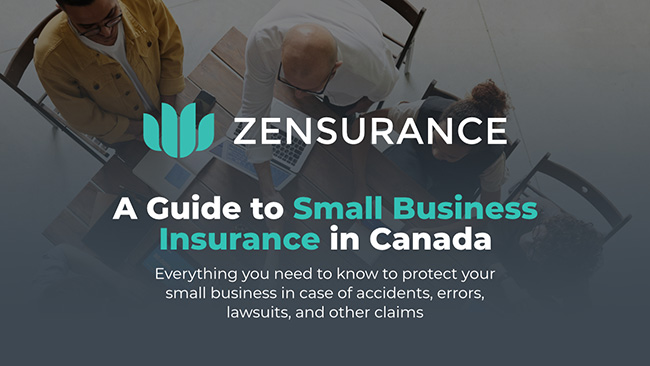The fourth quarter is peak season for many small businesses in Canada – it’s their big opportunity to grow their bottom lines before the end of the year. For business owners, this means hiring seasonal or temporary employees to meet customer demand effectively.
While seasonal hiring brings flexibility and helps boost the local economy, it exposes small businesses in Canada to the same legal and operational risks as permanent hires – sometimes amplified by the inexperience and short tenures of seasonal or temporary workers.
Reducing your small business’s risks and liability requires understanding the differences between seasonal and temporary employees and ensuring your organization’s business insurance coverage is adequate. Let’s dive in:

Related Posts
Categories
Seasonal vs. Temporary Employees: What’s the Difference?
You might think seasonal and temporary workers are the same, but they’re not. Despite many similarities, there are notable differences.
Seasonal employees: Seasonal employees are hired by business owners to address peak sales cycles throughout the year, such as during the holiday shopping season or during the summer tourism season.
Their employment typically lasts for a few months; they receive minimal training, are paid the minimum wage, and although they may enjoy a few perks from their employer, they often do not receive standard employee benefits.
Temporary employees: Temporary employees are usually hired to cover a business owner’s short-term labour needs, like filling in for a permanent employee who’s on paid leave, or working on a specific project for several months.
They may be hired directly by a business owner or through a recruitment and staffing agency, receive more in-depth training, and are compensated more handsomely. They may or may not be entitled to standard employee benefits. They could be full-time or part-time employees, depending on the role. Sometimes, temporary hires transition to permanent positions with a company.
What Liability Risks Do Businesses Face Hiring Seasonal or Temporary Employees?
Small business owners may overlook the liability risks associated with hiring seasonal or temporary employees. Some of those potential risks include:
1. Third-Party Liability
Your employees are the face of your small business and the frontline service professionals for your customers. However, if a seasonal or temporary employee accidentally causes physical or financial harm to a customer, you can be liable for the damages.
2. Internal Theft and Dishonesty
It’s important to trust the employees you hire, but not blindly. There are several types of internal crimes that business owners should be wary of, including cash or inventory theft, fraudulent expense claims, stolen equipment, and embezzlement.
3. Compliance With Provincial Employment Standards
Each province has its own Employment Standards Act. Even seasonal and temporary employees are entitled to minimum wage, and may qualify for public holiday pay, vacation pay, and statutory leaves as per your province’s laws. Failing to meet these provincial standards could result in expensive fines and other penalties.
4. Occupational Health and Safety Requirements
Every province also has precise occupational health and safety requirements to ensure safe workplaces for all employees, including seasonal and temporary workers. Failing to provide a safe work environment or necessary training to prevent injuries can result in fines, penalties, and liability if an employee is injured on the job.
5. Wrongful Dismissal Risks
If the employment contracts you have seasonal and temporary employees sign are not clear or are ambiguous, it could lead to a lawsuit or provincial fines. It’s vital to note that even seasonal and temporary employees are entitled to termination notices unless their contract explicitly states when their employment ends.
6. Privacy and Data Security Risks
Be careful about allowing seasonal or temporary employees access to your customers’ personal information. Provincial privacy laws and Canada’s Personal Information Protection and Electronic Documents Act (PIPEDA) regulate how businesses collect, store, and use their customers’ private information.
7. Business Insurance Coverage Gaps
Hiring seasonal or temporary employees may expose small businesses to gaps in their existing coverage. Be sure to review your general liability insurance, provincial workers’ compensation insurance, and all other coverages in your policy to identify and address any coverage gaps to ensure these workers are covered.
What Insurance Does a Small Business Need to Cover Seasonal or Temporary Employees?
Depending on the type of business and the products and services you provide to customers, your policy may require the following coverages:
- General Liability Insurance: General liability insurance covers third-party bodily injuries and property damages that harm customers or passersby on your commercial property or because of your business’s usual operations.
This type of coverage is essential for all kinds of small businesses. It may include product liability insurance to cover you for claims or allegations that a product you manufacture, distribute, or sell (including food items) caused a customer harm.
- Errors and Omissions (E&O) Insurance: Also known as professional liability insurance, E&O insurance protects against claims or allegations of professional negligence, substandard work, errors, providing incorrect advice, and failing to deliver a service as promised.
- Employers’ Liability Insurance: This type of insurance complements workers’ compensation insurance that’s administered through your provincial workers’ compensation board.
Whereas workers’ comp covers injuries or illnesses to your employees that occur in the workplace or because of the work they do, employers’ liability insurance is designed to cover employee-related claims for injuries or illnesses that aren’t covered by workers’ comp, or if an injured or deceased employee or their family sues your small business for damages.
- Cyber Liability Insurance: Cyber liability insurance is crucial for every small business, particularly in light of the growing risk of data breaches and cyber-attacks targeting small businesses.
It covers a business’s costs following a cyber incident, including legal advice, credit monitoring and notification fees, incident response expenses, and repairs and restoration of affected software systems.Our free downloadable cyber insurance guide shows you how to take simple, affordable steps to strengthen your cybersecurity and explains how cyber liability and cybersecurity insurance can protect your digital assets and safeguard your finances in the event of an attack.
- Commercial Crime Insurance: Commercial crime insurance is designed to cover a business owner’s financial losses resulting from business-related crime, including internal theft by employees, acts of employee dishonesty, forgery, robbery, and electronic crime.
There may be other types of coverage your policy should include. Speak to a Zensurance broker if you have questions about what your policy should feature and the coverage limits you require.
Protect Your Small Business With Comprehensive, Low-Cost Insurance
Finding comprehensive, low-cost business insurance protection for your organization online is easy through Zensurance.
We help protect Canadian small businesses and independent professionals in almost any industry with affordable policies that are customized to suit your company’s specific risks, so you can concentrate on growing your business.
Complete our online application now for a free quote in less than five minutes.
Our team of experienced, licensed insurance brokers will shop our partner network of over 50 insurers to find the right policy to suit your needs, answer your questions, and issue your policy documents and a certificate of insurance in 48 hours or less, so you’re ready to grow all year long.
Recent Posts
Zensurance $25,000 Business Grant Recipient: Sol & Sage Yoga
We are thrilled to announce the recipient of our $25,000 grant and recipients of our five $1,000 grants! Read on to learn valuable advice from these business owners for other entrepreneurs, and to discover why they consider insurance a crucial element of their financial stability.
How Canadian Small Businesses Can Use Artificial Intelligence (AI) to Increase Sales and Revenue
Using AI effectively can help Canadian small businesses attract more customers, increase sales, and improve customer service, often without new hires or large budgets. Many business owners are already using AI without realizing it. This guide explains how to start small, stay focused, and grow results in five practical steps.
5 Trends for 2026 Every Small Business Owner Should Know
See what’s hot for the year ahead with these five trends that Canadian small business owners and independent professionals should have on their radar in 2026, and how they can work them into their strategies.
Sign Up for ZenMail
"*" indicates required fields









